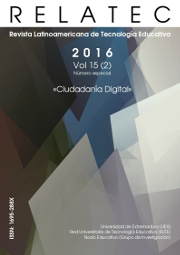Apropiación educativa de la cultura en los medios: ciudadanía digital / Educational appropriation of culture in the media: digital citizenship
DOI:
https://doi.org/10.17398/1695-288X.15.2.11Abstract
Este monográfico recoge reflexiones teóricas, experiencias aplicadas e investigaciones que muestran formas diferentes de estar en los medios, de ser y de hacer ciudadanía digital. Contribuciones desde la Red Universitaria de Investigación e Innovación Educativa. Cambios Sociales y Retos para la Educación en la Era Digital (REUNID+D) a través de un proyecto financiado por el Ministerio de Economía y Competitividad (EDU 2015-68718-REDT) que permite reunir a diez grupos de investigación en el ámbito de la educación y la tecnología educativa de diez universidades españolas, coordinado por Juana María Sancho Gil de la Universidad de Barcelona. Además, este número especial presenta algunos resultados de investigación del proyecto de investigación de I+D+i titulado: «Ecologías del aprendizaje en contextos múltiples: Análisis de proyectos de educación expandida y conformación de ciudadanía», del Ministerio de Economía y Competitividad (EDU2014-51961-P), coordinado por Juan Bautista Martínez Rodríguez de la Universidad de Granada.Downloads
Downloads
Published
Issue
Section
License
Authors who publish in this journal accept the following conditions:
1. The Author retains copyright in the article. Upon acceptance of the article, the author shall grant to the Publisher the right of first publication of the article. with the dcoument registered with the Creative Commons Attribution-NonCommercial-NoDerivative 4.0 International (CC BY-NC-ND) license, which allows to third parties to use what is published whenever they mention the authorship of the work and the first publication in this journal.
2. Authors can make other independent and additional contractual agreements for the non-exclusive distribution of the article published in this journal (eg, include it in an institutional repository or publish it in a book) provided they clearly indicate that the work was published for the first time in this journal.
3. Authors are allowed and recommended to publish their work on the Internet (for example on institutional or personal pages) before and during the review and publication process, as it can lead to productive exchanges and a greater and faster diffusion of published work (see The Effect of Open Access).









